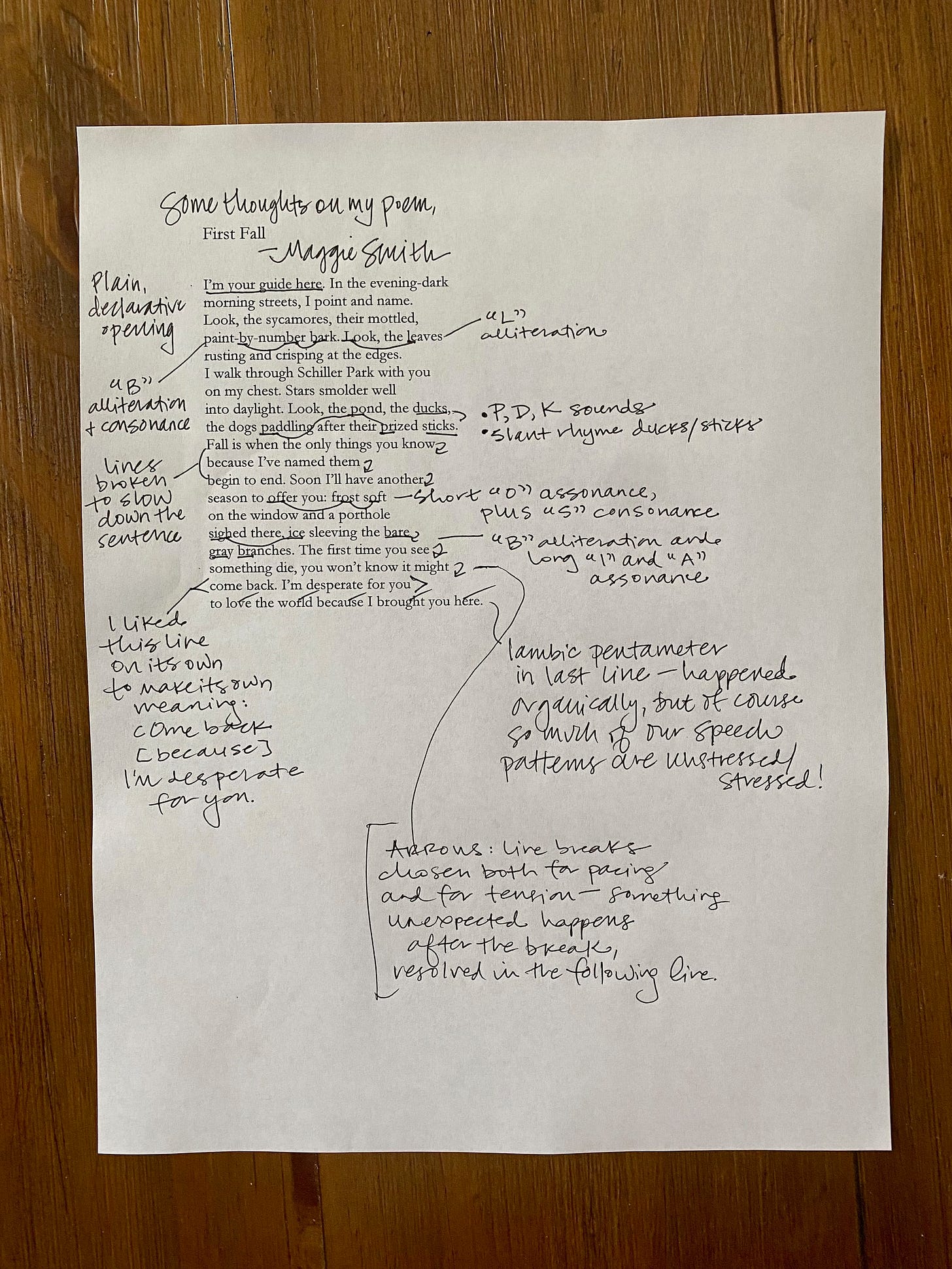Behind-the-Scenes Look: "First Fall"
Annotation & Author's Note
Hi, Friend.
One of my favorite parts of this newsletter is sharing behind-the-scenes looks at poems. My hope is that these annotations might be useful to you as a writer, teacher, or reader of poetry. This week I’ve annotated “First Fall,” a poem that was first published online in Diode, then in my book Good Bones, and most recently appears in my memoir, You Could Make This Place Beautiful.
I wrote about the poem in the memoir because it was an important poem for me, as a writer and as a parent. It was the first poem I wrote after becoming a mother, and after a long year of writing zero poems. And then, thank goodness, a poem arrived. This one.
In the handwritten annotation above, I’ve noted some of the craft decisions I made related to sound and rhythm, and to sentence and line. The poem opens with a short, declarative sentence, plainspoken rather than poetic: “I’m your guide here.” But it ends with a line that, rhythmically at least, is much more poetic, because it is in iambic pentameter.
If you’ve been reading these annotations each month, you know how much I love assonance, and there is no shortage of it in this poem. For example, you can hear the long O in offer, frost, and soft; you can hear the long I in sighed and ice, and again in might and die. Consonance and alliteration work together in this poem; for example, in the B sounds of “paint-by-number bark.”

You can also hear both consonance and alliteration in the P, D, and K sounds in lines 8 and 9: the P in pond, paddling, and prized; the D in daylight, pond, ducks, dogs, paddling, and even the end of prized; and the K in ducks and sticks. Of course S sounds pop up throughout these lines as well: ducks, dogs, sticks.
into daylight. Look, the pond, the ducks,
the dogs paddling after their prized sticks.
Regarding line breaks, my two major considerations were pacing and tension. I read my poems aloud as I draft, and often—intuitively—I hear where the line wants to break. But I also like to use enjambment to create some suspense and to surprise the reader. In the annotation I marked some of those moments with small arrows. “The first time you see”…what exactly? And “you don’t know it might”…do what?
The poem describes walks I’d take with Violet every day, strapping her into the baby carrier and walking her around the historic German Village neighborhood where we lived the first year of her life. We’d walk through Schiller Park—yes, there is a bronze statue of the German poet Friedrich von Schiller there—and I’d point out things to her as we passed, as if I were a tour guide. That’s sort of what early parenthood felt like: being the tour guide for someone new to the world.

I wanted my daughter to love this place I brought her to, and I wanted the world to deserve her. This theme comes up in other poems of mine. “Porthole” from Goldenrod opens like this:
I was hoping the world would earn you,
but it rains and rains, too busy raining
to win you over.
“Good Bones” has this current running through it, too, because the world I brought my children to is an imperfect world. I wish I could offer them 100% beauty and safety, but that percentage isn’t possible.
I think we all have themes and big questions that we grapple with again and again in our work. What are some of yours?
Happy writing—
Maggie



I will say that of the many good things that came from my divorce, one was certainly being disabused of the notion that I would be able to prevent my children from ever experiencing pain, particularly pain around family, which is one of those themes I return to over and over again. Now what I hope, and this has come to be true over the last 11 years, is that when we experience pain we keep each other good company. And I am realizing that is both more realistic and much, much more meaningful.
Having come from a family where there was a lot of addiction and violence, even as we were progressive people of faith, I wrestle in my writing (and in my life) continually with the notion of integrity. What is it? How do you actually practice integrity as an inevitably imperfect human? How do go about working through your periodic failures of integrity, both internally and with others, so that you can get back to yourself and function lovingly and honestly with the people around you? I circle around this continually because, as Toni Morrison used to say, I'm trying to write the thing I wish I could read. Certainly that I wish I could have read when I was growing up and being taught, emphatically, how important it was to live with integrity but not being offered any useful information about *how* to actually accomplish such a thing.
Maggie, I’m a new fan and just want to say hi. I’m a writer and editor and podcaster. I loved your new memoir! Esp. how you structured it in short chapters and kept asking the same question over and over. I can’t lay my hands on my copy so I’m not remembering the exact phrasing. I puzzled over that question!